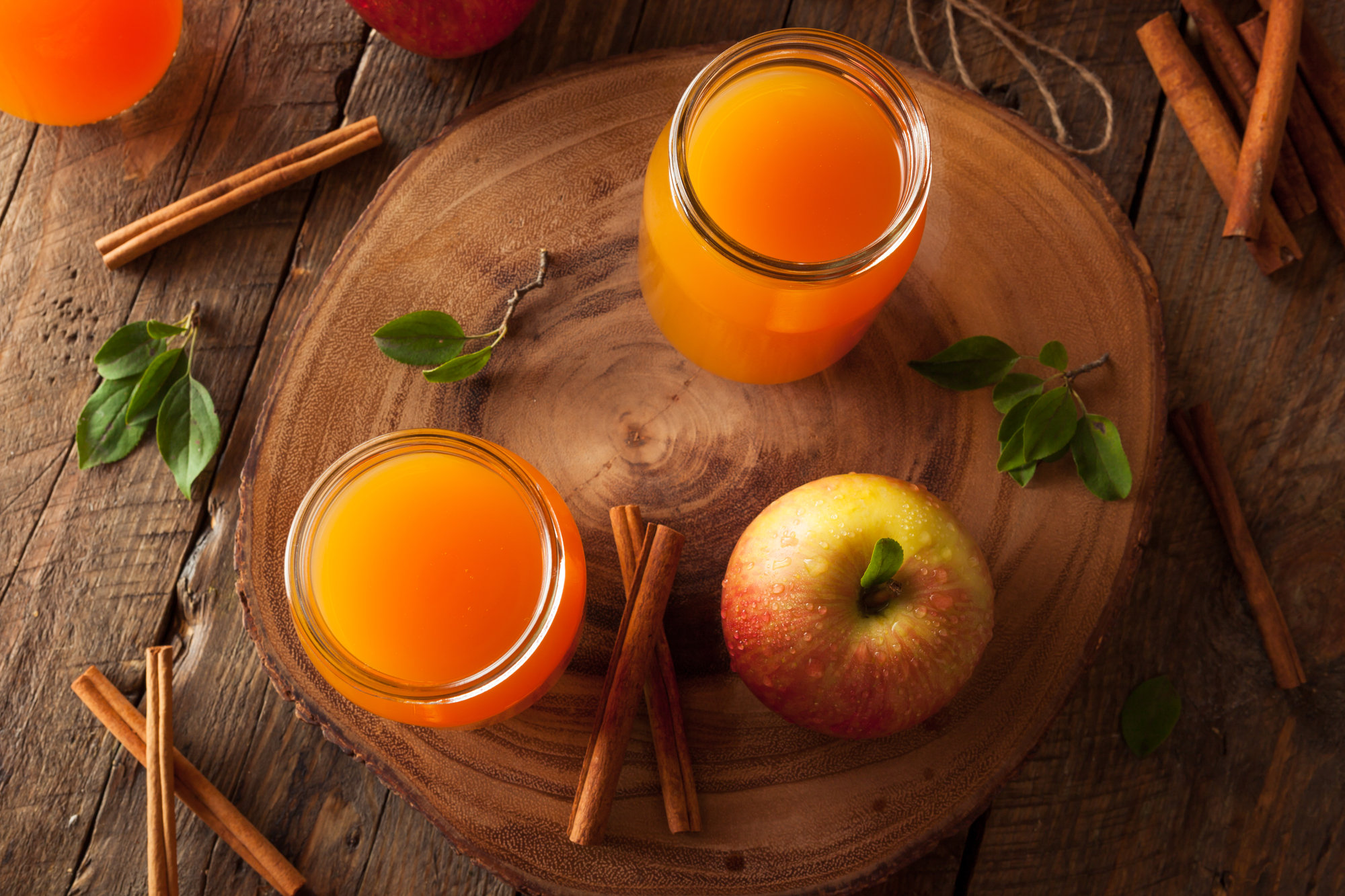Apple Cider vs. Apple Juice: What’s The Difference?
Apple juice is typically made from the filtered juice of pressed apples. In the United States, apple cider is often made using the unfiltered juice of pressed apples, usually causing it to appear darker than apple juice. When comparing the two, apple cider is more likely to be unpasteurized.
Apples are a delicious snack that you can make tasty drinks from, such as apple juice and apple cider. But are these two apple drinks really all that different?
Apple juice is a drink made from the juice of pressed apples. In the United States, commercially sold apple juice is usually filtered to remove leftover apple parts and sediment. Additionally, the juice is pasteurized to remove bacteria and other potentially harmful microorganisms. As a result of these processes, apple juice usually has a long shelf life and is somewhat transparent. Apple juice sometimes has sweeteners added to it as well.
Apple cider is also made from the juice of pressed apples. In the United States, apple cider is typically made using unfiltered apple juice. Apple cider is often less transparent because of the leftover apple sediment, and it doesn’t usually have any added sweeteners in it. As a result, apple cider tends to taste sharper than apple juice. That is, it has a stronger, slightly tangy apple flavor to it.
Traditionally, American apple cider was often unpasteurized. This meant that it had a much shorter shelf life than most apple juice because of the higher likelihood of containing microorganisms.
Nowadays, though, it is more common for producers to pasteurize apple cider to avoid foodborne illnesses that might spread through the cider. If apple cider is unpasteurized, American law requires that this be indicated on a product warning label before it can be sold.
In the United States, the term apple juice is typically not used to refer to any beverage that has alcohol in it. The term apple cider, though, may be used for certain alcoholic beverages. However, it is more common to refer to apple cider that has been fermented into an alcoholic beverage as hard cider or just cider to avoid confusion. Legally, any beverage that has alcohol in it and is sold in the US must be clearly labeled as such.
source: dictionary.com
ANSWER THE QUESTIONS:
What is the primary difference between apple juice and apple cider in terms of their appearance, particularly in the United States?
Answer: In the United States, the primary difference in appearance is that apple cider is often made using unfiltered apple juice, causing it to appear darker than the typically filtered apple juice.
Explain the typical processing differences between commercially sold apple juice and apple cider, focusing on the filtration and pasteurization processes.
Answer: Commercially sold apple juice is usually filtered to remove leftover apple parts and sediment, and it is pasteurized to eliminate bacteria and other potentially harmful microorganisms. Apple cider, on the other hand, is often unfiltered, and it may be unpasteurized, making it less transparent and potentially sharper in taste.
How does the taste of apple cider differ from apple juice, and what factors contribute to this difference in flavor?
Answer: Apple cider tends to have a stronger, slightly tangy apple flavor compared to apple juice. This difference is attributed to the lack of filtration and the potential absence of added sweeteners in cider, allowing the natural apple sediment and flavor to remain more pronounced.
Historically, why did American apple cider have a shorter shelf life than most apple juice, and how has this changed in contemporary production?
Answer: Historically, American apple cider had a shorter shelf life because it was often unpasteurized, increasing the likelihood of containing microorganisms. In contemporary production, it is more common for producers to pasteurize apple cider to extend its shelf life and prevent the spread of foodborne illnesses.
In the United States, how is the use of the terms “apple juice” and “apple cider” related to the presence of alcohol, and what alternative term is commonly used for fermented apple cider that contains alcohol?
Answer: In the United States, the term “apple juice” is typically not used to refer to any beverage with alcohol. The term “apple cider” may be used for certain alcoholic beverages, but fermented apple cider with alcohol is commonly referred to as “hard cider” or simply “cider” to avoid confusion. Legally, any beverage with alcohol must be clearly labeled as such.
filtered juice – succo filtrato
pressed apples – mele pressate
to compare – confrontare
unpasteurized – non pastorizzato
tasty – gustoso
commercially sold – venduto in commercio
sediment – sedimento
additionally – inoltre
harmful – dannoso
as a result of … – come risultato di …
long shelf life – lunga durata di conservazione
somewhat transparent – un po’ trasparente
tangy – piccante
likelihood – probabilità
to avoid – evitare
foodborne illnesses – malattie di origine alimentare
to refer to – fare riferimento a







